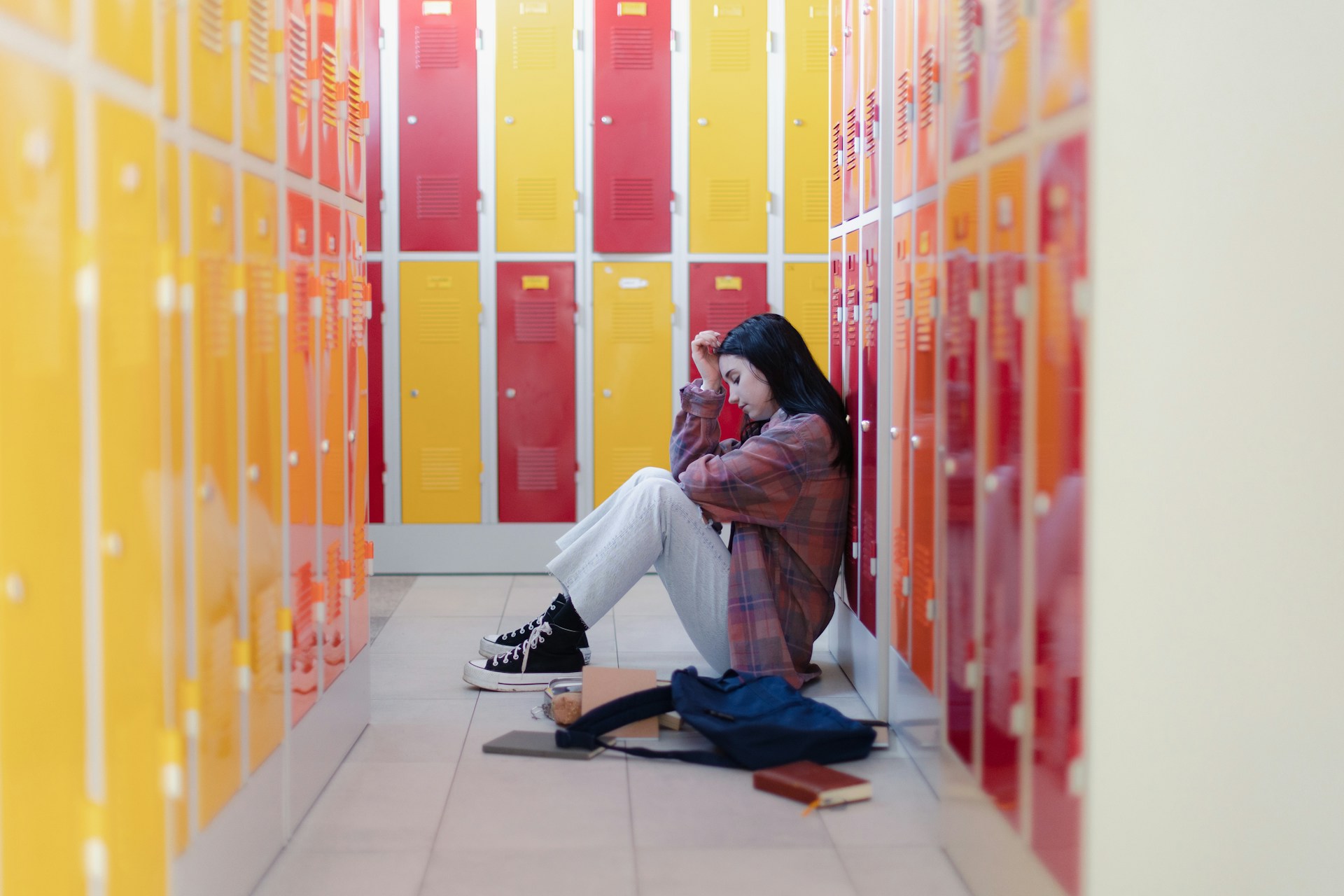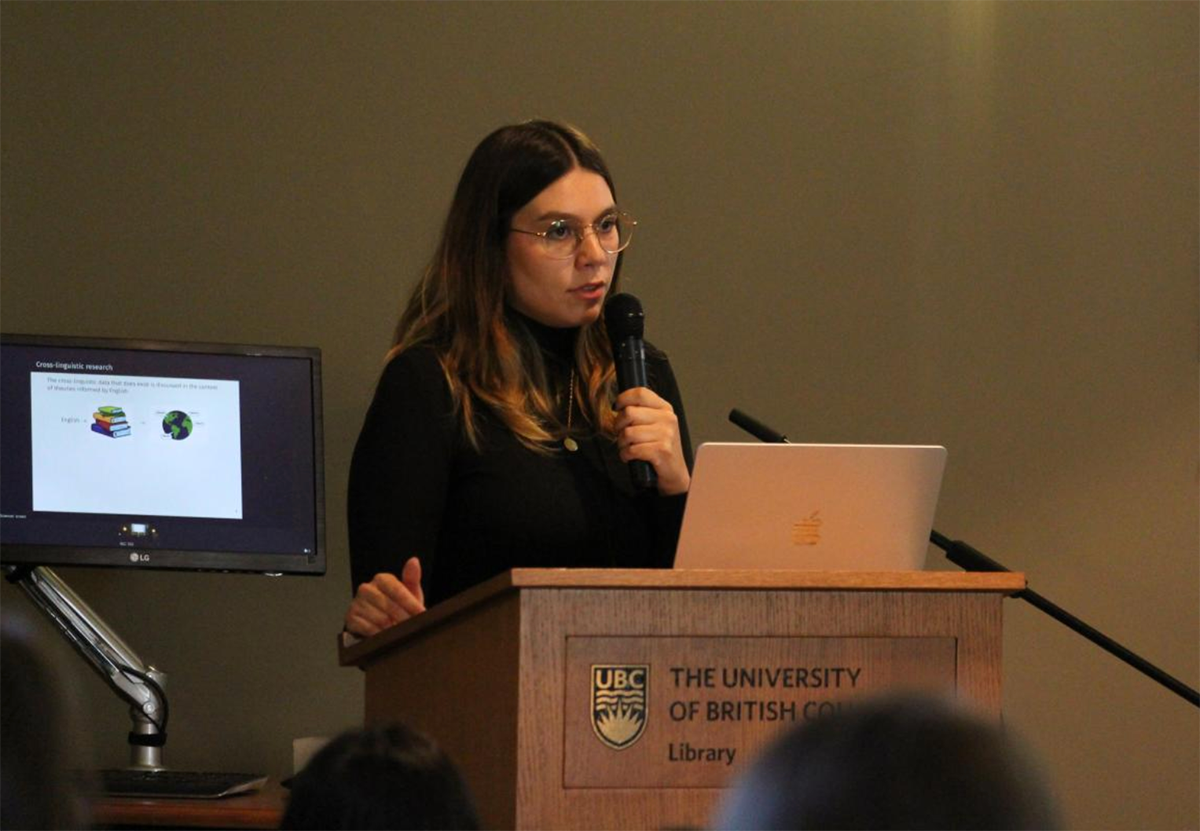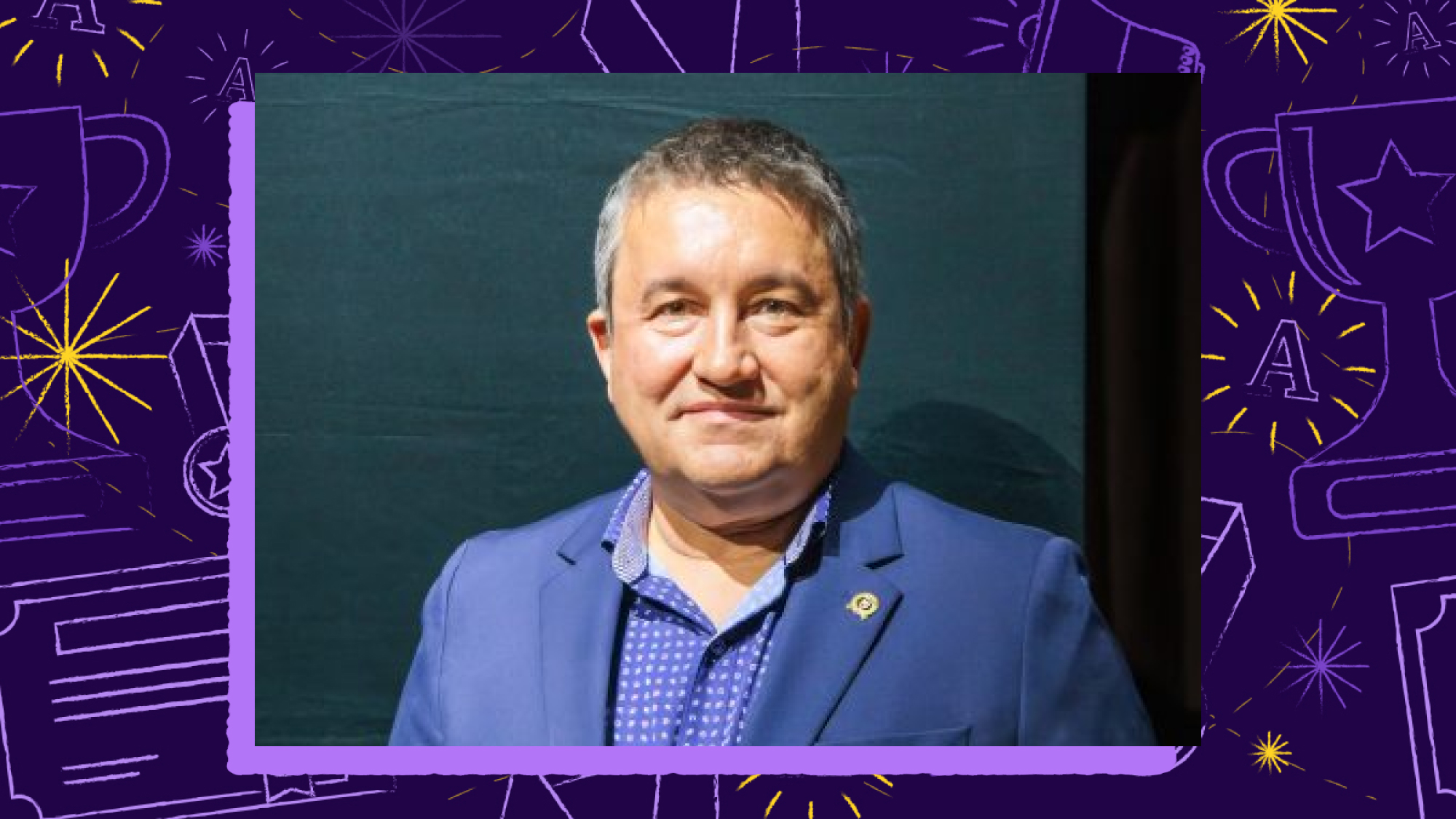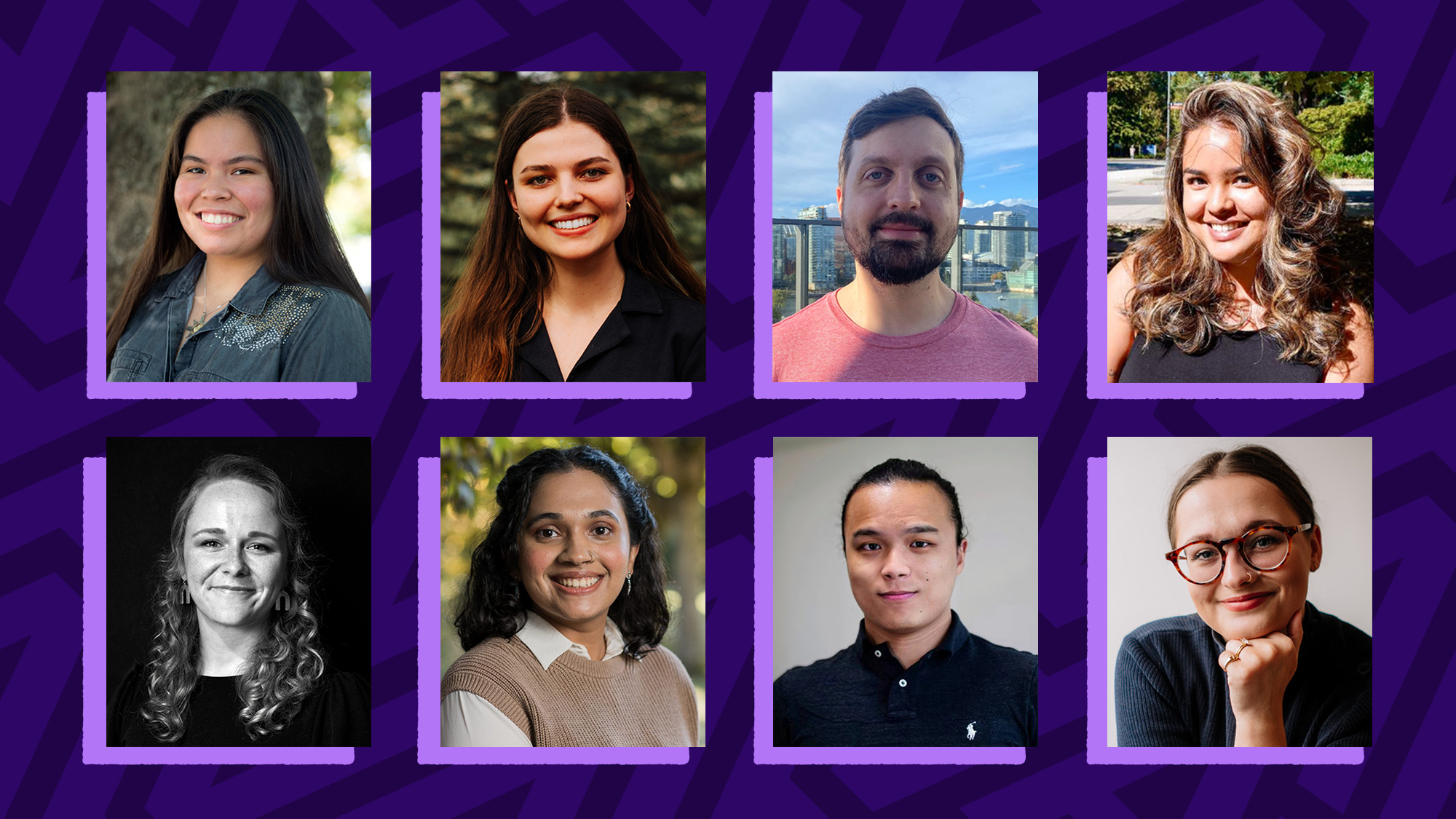

Wondering whether to pursue grad school after completing your Bachelor’s degree? It’s a big decision, and the prospect can feel overwhelming. There are a lot of practical considerations around financing and degree choice, as well as questions about how different the experience is to undergrad life.
Only you will know what’s right for you, but some current Arts grad students are here to share more on why they applied for grad school, what they’ve learned about juggling research, work, and a social life, and what achievements they’re proud of.
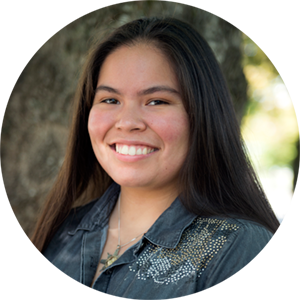

Adina Williams (she/her)
Department of History
Master of Arts
Area of research: Indigenous oral histories.
Is there a UBC Arts resource that has been helpful on your grad school journey?
I started thinking about grad school when I was an undergraduate student in First Nations and Indigenous Studies, but I had no idea what to expect in the application process or how to even start an application to grad school. I reached out to the wonderful advisors at the Arts Indigenous Student Advising (AISA) office, who connected me with the appropriate people as an Indigenous student applying to grad school at UBC. I will always be grateful for the generous support of AISA and the patience they had for me as a student new to applying to grad school.
What scholarship or grant opportunity helped you achieve the goal of getting into grad school?
I’m grateful to have been a recipient of the UBC Indigenous Graduate Fellowship, which was an important funding source for me. I was also funded through a fellowship in the History department in my first year. There are also important scholarship opportunities for First Nations graduate students from organizations such as the New Relationship Trust Foundation and the Irving K. Barber Scholarship Society, among many others, and I am grateful for their support in my graduate studies.
Do you have any top tips to find friends and community as a grad student?
For Indigenous grad students—Rebecca and Tarene at Indigenous Graduate Initiatives (based out of the Faculty of G+PS Studies) are constantly creating opportunities and spaces for Indigenous graduate students to connect and build community amongst each other. They have also been very supportive in locating important resources for funding and have been critical in supporting me in my journey throughout grad school.


Anna Stacey (she/her)
Department of Linguistics
Master of Arts
Area of research: I primarily work on using machine learning technology to support the revitalization of low-resource languages.
Tell us why you decided to go to grad school at UBC Faculty of Arts.
I decided on grad school because my undergraduate studies supported my passion for my subject area, inspiring me to learn more after graduating. I then chose UBC because the department was very friendly and welcoming. It’s nice to have an atmosphere that balances a rigorous academic environment with a down-to-earth community.
What’s the biggest misconception that you had about grad school as an undergrad?
I didn’t know many grad students before becoming one myself, so I know it can be tough to get a sense of what grad school is really like. I had thought it would be like a continuation of undergrad, but in fact it’s been more of an opportunity to take the knowledge I gained as an undergrad and apply it to interesting real-world challenges. That said, the day-to-day reality of grad school varies by department, so I would suggest thinking about what would be fulfilling for you, and then talking to grad students in programs you’re considering.
What scholarship or grant opportunity helped you achieve the goal of getting into grad school?
I find applying for scholarships pretty daunting, as it’s a bit uncomfortable to write about your own accomplishments and potential. But it’s a great chance to practice facing discomfort and putting some belief in yourself into action. My grad studies have been supported by awards I wasn’t even sure I should bother applying for, but then ended up receiving. If you’re not getting any rejections, then you’re not being ambitious enough in what you apply for!
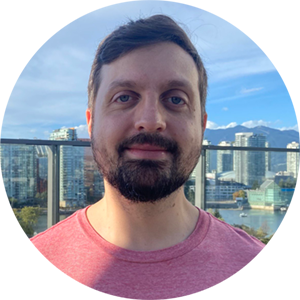

Carlos Norcia (he/him)
School of Creative Writing
Master of Fine Arts
Area of research: A novel that follows the trajectories of two Brazilian families, starting in the 1970’s and ending in 2020, as the protagonists’ lives intersect with the contemporary history of authoritarianism in Latin America.
Tell us why you decided to go to grad school at UBC Faculty of Arts.
I was living in São Paulo, Brazil before I applied to UBC and, due to the pandemic, during my first year in the program. Even in Brazil, the UBC School of Creative Writing’s MFA program is recognized and talked about. I had also previously visited Vancouver a couple of times, so I was planning to study at UBC for a while before I eventually applied—and I was so happy and proud to be accepted!
What have you learned so far about juggling research, work, and a social life?
I learned that I had to keep nurturing the part of me that is passionate and interested in art, film and literature, even if it’s not directly related to what I’m studying for my thesis. Otherwise, all of my creative energy and curiosity goes to my thesis and to my work as a TA, which eventually makes me feel drained. So it’s important to learn to keep that balance between work and just being curious and engaged by things! Having a social life is also very important for me. So I learned to write reminders for myself that force me to remember to contact my friends, so that I’m not one of those friends who only talks to people when they reach out to me.
Do you have any top tips on finding a thesis topic you’re passionate about?
Pay attention to the topics and themes that you’re passionate about—particularly if you feel kind of challenged by them. If there’s a topic that causes that kind of impression on you, then that’s probably something that’s worth following along to see where it leads you!
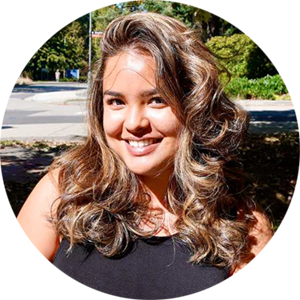

Karla Jubaily (she/her)
School of Journalism, Writing, and Media
Master of Journalism
Area of research: I am committed to exploring the intersections of identity, culture, and social justice while amplifying diverse voices and inspiring change through my writing and reporting.
Do you have any top tips on finding a thesis topic you’re passionate about?
What is a problem you’re trying to solve? Who do you hope your work will serve? I think finding purpose in your research will drive you the most. You can find that in the most unexpected places, so be open-minded. For me, I find inspiration and motivation through reading memoirs and human-interest stories, my heritage, and anyone around the world that are working towards a better society for their community.
Do you have any top tips to find friends and community as a grad student?
Attend as many free student-organized events as you can, whether it is through the Graduate Student Society or different UBC departments. Go to Clubs Days, meet people in person, or start your own events. You will find friends and like-minded people who will shape your UBC experience beyond academia!
Tell us about an achievement you’re proud of or an experience you’ve liked in grad school.
Last year, I took Imagine Journalism Studio where I developed a business proposition for a podcast at the intersection of food and memory. That podcast is now live! My hope is to promote connection and belonging, to educate, inspire, and entertain while fostering a greater appreciation for global cultures and their culinary traditions, and to tell stories that feel nourishing to the soul.
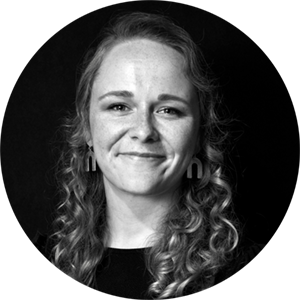

Maggie Whiteman (she/her)
School of Music
Master of Music in Wind Conducting
Area of research: My studies include the history of wind music and its effect on current literature and rehearsal techniques.
Tell us why you decided to go to grad school at UBC Faculty of Arts.
There was one singular moment when I knew that I wanted to be a member of the UBC Faculty of Arts. It was a cold November day and I took time off from my teaching job in the United States. I drove up to UBC to observe Dr. Robert Taylor rehearse the UBC Symphonic Wind Ensemble. It was within the first five minutes that I was hooked. I had traveled around to various schools, but the sounds that I heard in those initial moments were magic. I felt an exquisite blend of predicting the flow of instruction and embracing the moments of being blindsided by a brilliant new strategy or description. As if that wasn’t enough, Dr. Taylor was incredibly personal and kind throughout my visit. Dr. Taylor has a reputation of excellence throughout the US, but seeing it in action that day was all the convincing that I needed.
What’s the biggest misconception that you had about grad school as an undergrad?
I truly believed that the graduate students that I witnessed were essentially at the same level of proficiency and knowledge as my professors. The whiplash of realizing that, indeed, we are all constantly figuring out was delightfully significant. It does put a certain amount of confidence in my steps here at UBC, but it also makes me appreciate the graduate students that I learned from even more. I love that the UBC Faculty of Arts is a collaborative space where I’m given room to become the best version of myself, even if I’m still figuring out what that looks like.


Sakshi Sahakari (she/her)
Department of Psychology
Master of Arts
Area of research: Exploring psychological variations (particularly culture and personality) and how they relate to geography.
Tell us why you decided to go to grad school at UBC Faculty of Arts.
I was a UBC Psychology undergraduate student when I first discovered and nurtured my interest in research. While I applied widely for grad school, I ultimately chose UBC. I didn’t make this decision just because UBC felt like home, but because there wasn’t another program that emphasizes research productivity and collaborative learning the way UBC does.
What are the top three things that undergraduates should consider before applying?
- Mentor-mentee fit: You want to make sure that your working styles and mentorship needs are compatible with your supervisor(s). A good mentor-mentee fit is key in making sure you can achieve your academic goals and be content in your research explorations.
- Funding: As an international student, it was hard to come by any funding options when I was applying for grad school. I’ve since realized it is an important source of support when you are focusing on exploring your research interests.
- Research interests: Think through your career goals/research interests in order to find the right program. Sometimes, you might find that your research might better align with a different program than you would have thought!
What’s the biggest misconception that you had about grad school as an undergrad?
I thought that when I started grad school, I would somehow miraculously find more time to pursue my research interests. But I’ve since learned that there is no way to sustain my passion for research if I do that. Instead, I must carve out time for non-research/work aspects of my life to be able to engage with my work fruitfully.


Song Fu (he/him)
School of Public Policy and Global Affairs
Master of Public Policy and Global Affairs
Area of Research: Professional program with no thesis component, currently working on land governance in the Mekong region.
What’s the biggest misconception that you had about grad school as an undergrad?
My biggest misconception is that you will have more free time at your disposal. By free time, I don’t mean a reduced workload, but rather, you will sit in a classroom less and have more energy to explore other aspects of academia. Part of it is true, right now, that I have considerably more free time compared to during my undergrad. The other part is completely untrue—I also have significantly more responsibilities and commitments, which pretty much occupy all of my remaining time slots. I think that prior to joining my program, I just never thought things could get this busy.
What have you learned so far about juggling research, work, and a social life?
The lesson I learned is that you can’t have a perfect balance. Unless you can work like a perfect machine and always stay on top of things, chances are that more than often, you will need to arrange things at the very last minute and make compromises. So, understanding your priorities and having an organized calendar is a must for everyone in grad school.
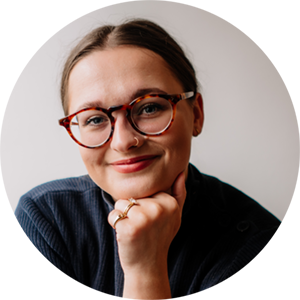

Susanna Cassisa (she/her)
Department of Central, Eastern, and Northern European Studies
Master of Arts
Area of research: Examining the transnational history of anti-queer narratives of “seduction,” “recruitment,” and, most recently, “grooming,” throughout the last century.
What’s the biggest misconception that you had about grad school as an undergrad?
That grad students have it all figured out—we don’t!
Do you have any top tips on finding a thesis topic you’re passionate about?
Follow your interests, even if they’re unconventional in your field, and don’t write off topics that might not traditionally be seen as “scholarly enough.” My interest in my thesis topic initially came from scrolling Twitter (now X), getting curious about the history of the rhetoric I was seeing there, and believing that this was worthy of scholarly interrogation. Also, the thesis form can be more flexible than you might think. If you’re interested in pursuing a more creative way of delivering your research, talk to your supervisor. That’s how I ended up working on a podcast instead of a traditional academic thesis.
Tell us about an achievement you’re proud of or an experience you’ve liked in grad school.
Over the summer, I worked as an intern for Made by History at the Washington Post. I really enjoyed working at the intersection of academic research and public-facing writing and hope to work in a similar field after graduating. In this position, I was also able to publish an article on my own research, which was a very rewarding experience.
